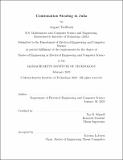Continuation Stealing in Julia
Author(s)
Trollback, August
DownloadThesis PDF (523.6Kb)
Advisor
Schardl, Tao B.
Terms of use
Metadata
Show full item recordAbstract
Work stealing schedulers are widely used by parallel programming platforms to distribute tasks across multiple processors. Memory blowup from scheduling a program with work stealing can be bounded by using continuation stealing when new tasks are spawned. Continuation stealing is opposed to child stealing, a different method for spawning tasks that is simpler to implement, but comes at the expense of potentially unbounded memory use. An extension to the Julia programming langauge that adds support for optimizable spawn and sync parallel constructs has been proposed, but it does not currently support continuation stealing. In my thesis, I implement continuation stealing in Julia using two different metaprogramming approaches. One approach uses Julia’s macro system, while the other uses the Julia compiler’s internal representation (IR) of functions. My results show that the IR-based approach uses less memory than the child stealing implementation in the proposed extension to Julia, while having similar speed.
Date issued
2023-02Department
Massachusetts Institute of Technology. Department of Electrical Engineering and Computer SciencePublisher
Massachusetts Institute of Technology